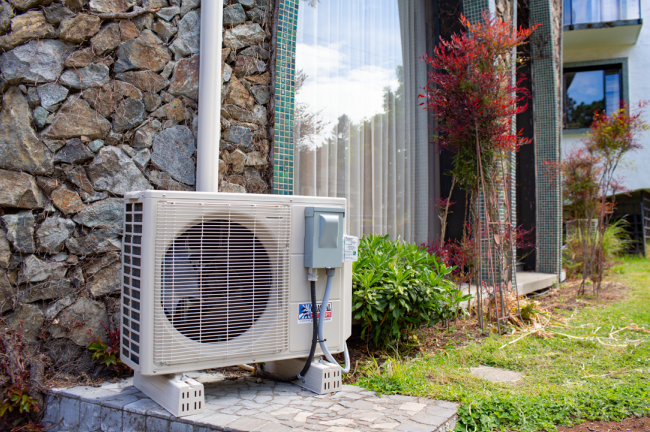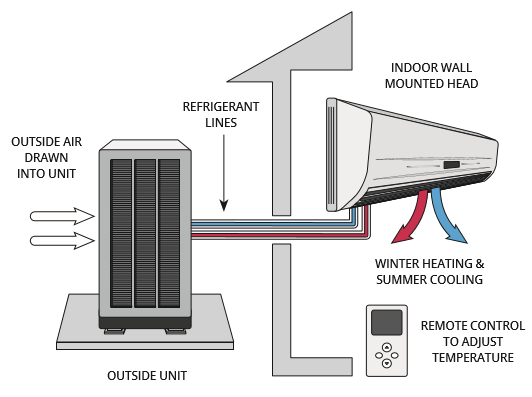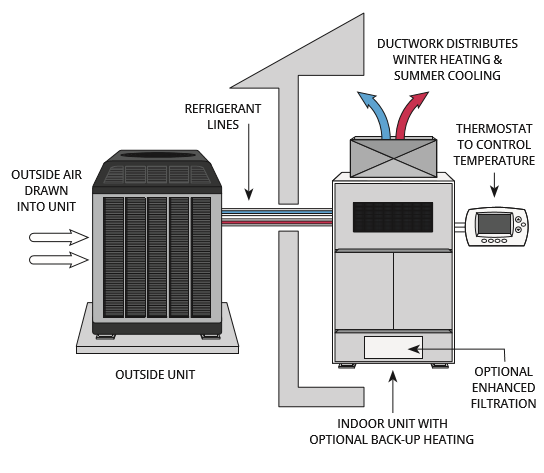Need help navigating retrofits?
Register for free today!
What to Ask your Heat Pump Contractor
This guide provides advice on what to look for and what to expect when upgrading to a heat pump
What is a Heat Pump?
Heat pumps provide both heating and cooling for a home by extracting heat from the surrounding air and moving it to another location. When heating during the winter, the heat pump extracts heat from the outdoor air, even when it’s cold, and transfers it into the home to provide warmth and comfort. When cooling during the summer, a heat pump extracts heat from the inside of the home and transfers it to the outside air. Heat pumps provide energy efficient heating and cooling, dehumidification, air filtration, and when upgrading from oil, natural gas, or propane heating, significant greenhouse gas reductions!
Mini-Split Heat Pump
Mini-splits are great for open-concept homes and for zonal heating and cooling.
Central Heat Pump
Central heat pumps use ductwork to deliver heating and cooling throughout the home.
Buyer Best Practices
- Work with a CleanBC Registered Heat Pump Contractor. Visit betterhomesbc.ca/find-a-contractor/ to find a contractor the services your area.
- Address home air leakage and insulation issues before purchasing your heat pump to maximize energy savings and system performance, and reduce operation costs.
- Obtain 2-3 quotes prior to purchasing a heat pump and review and compare the quotes for heat pump brand, system efficiency, installation costs and, warranty. Remember the cheapest system may not be the right system for your home or offer you the most value for your money.
- Installation costs vary based on the type, brand, size, efficiency, features of the heat pump, and the heating and cooling needs of your home. On average, heat pumps are $6,000-$22,000.
- Some heat pump systems require a supplementary heating system; however this depends on the efficiency of your home, how cold it gets where you live, and the type of heat pump you install. Speak with a Registered Contractor to learn about the best heat pump heating solution for your home.
Rebate and Grant Eligibility
- The heat pump must become the primary heating system for the home and serve a main living area.
- Always review rebate pages on BetterHomesBC.ca before installing a heat pump for current program requirements.
- Rebates are available through CleanBC, depending what heating system you start with and what type of heat pump you install.
- CleanBC Energy Savings Program offers enhanced rebates designed to cover up to 100% of the cost of home upgrade costs.
What to Expect Post-Install
No More Intermittent Blasts of Hot Air
- Unlike conventional systems that burn natural gas, oil, or propane quickly to generate warmth, heat pumps continuously provide consistent warmth and work very efficiently to maintain the specified temperature and indoor comfort.
- Make sure you ask your contractor about the user controls to get the most out of your new system!
Changes to Your Utility Bills
- Switching from oil or electric resistance heating has the greatest reductions in heating costs. Switching from natural gas may result in similar heating costs.
- Completing additional energy upgrades (such as air sealing, insulation or windows) will further reduce your energy bills and enhance home comfort.
Outdoor Noise
- The outdoor units of heat pumps do make some noise. The sound rating of a heat pump is an indicator of the sound level of the outdoor heat pump unit, measured in decibels. The lower the sound rating is, the quieter the unit will be.
- Modern indoor heat pump units are generally rated between 18-30 decibels and outdoor heat pump units are around 40-60 decibels. For comparison, a normal indoor conversation is roughly 50 decibels loud.

Heat Pump Operation Tips
Set the Thermostat & Forget It
Set your heat pump thermostat to a comfortable temperature then let it be so you can maximize the heat pump’s efficiency.
Use the Heat & Cool Mode, Avoid the Auto
Use the thermostat ‘Heat’ or ‘Cool’ mode rather than ‘Auto’ temperature setting to avoid unnecessary switch overs.
Only Use the Backup When Required
Set all back-up system thermostats 5°C below your heat pump thermostat setting to ensure your heat pump is the primary heating source and only use the back-up when needed.
Keep Indoor & Outdoor Units Clean & Clear
Ensure good air flow for indoor and outdoor units. Reduce equipment wear and tear by keeping outdoor unit grates and coils clean and clear of debris.
Ensure Proper Filtration
Clean or replace the filters as directed by the instruction manual, when the filter indicator lights turn on, or when they become visibly dirty.
Maintaining Your Heat Pump
Now
If applicable, check the batteries in the remote control and replace if necessary.
Regularly
Clean or replace the filters as recommended by the operation manual.
Seasonally
Clear the outdoor unit of any debris, snow, and dirt. Do not pressure or power wash unit as it may cause damage or blockage within the coils.
Annually
Have your heat pump serviced by a professional technician to check the system’s components and function, including the motor, compressor, refrigerant lines, reversing valve, ducting, and electrical.



